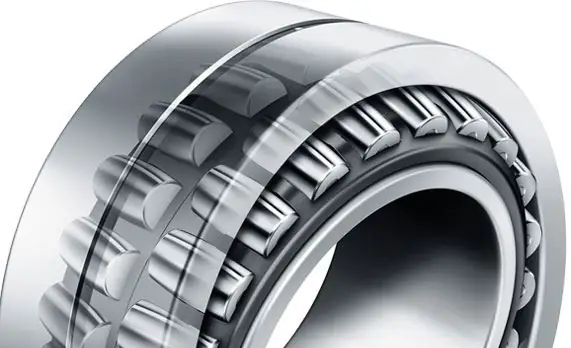2026 Author: Howard Calhoun | [email protected]. Last modified: 2025-01-24 13:10:26
Absolutely any engine is a fairly complex mechanism that consists of many different components. Every detail of this mechanism ensures the smooth and correct operation of the entire system as a whole. At the same time, some details in a large mechanism can play serious roles, while others are not so functional. The crankshaft, like other components and parts that are directly related to it, is the most significant part of the internal combustion engine. It is he who ensures the rotation of the flywheel by converting the energy of combustion of the fuel mixture into mechanical work.
One of the important parts in the engine device is the main bearing. This is a small part in the form of a semi-ring made of metal of medium hardness, which has a special anti-friction coating. When the engine is operated for a long time, these bearings or bushings are subject to severe wear. In the article, we will take a closer look at these small, but very important elements of the internal combustion engine.
General Description
The engine main bearing or bushing is nothing but a plain bearing,allowing rotation of the crankshaft. The rotation process takes place as a result of the combustion of the fuel mixture in the combustion chamber. During the active operation of the engine, the parts experience friction - increased loads, as well as high speed mode, can damage the motor. To prevent this situation and to minimize the degree of friction, the main significant elements are covered with a thin layer of lubricant - in this case it is engine oil. The main bearings of the crankshaft are lubricated by means of a regular lubrication system. In this case, the oil film is formed only under the influence of high oil pressure. There are holes on the working surface of the liners, as well as annular grooves for supplying lubricant to the crankshaft journals.

Destination
In engines of any design and any type, crankshafts are constantly subjected to enormous loads - physical and thermal. During engine operation, the main bearing holds the crankshaft on the axis. The operation of the crank mechanism is supported and provided only by these liners. The crankshaft journals are presented in the form of internal clips, and the main liners are external. These parts, as already noted, are lubricated through the oil channels.
Device in detail
So, a thin-walled insert is a steel tape bent into a half-ring shape. A special anti-friction layer is applied to the working surface of the part. These are tin-aluminum alloys. In motors with increased loads as an anti-friction coatinglead bronze is used.
Materials
The main bearing is made up of several layers. The first layer is predominantly copper - the percentage of copper is from 69 to 75 percent. The second is made from lead - it is contained in an amount of 21 to 25 percent. Tin is used as the third layer - no more than 4 percent.
Sizes
The thickness of the main bearing shell is about 1.5-2 millimeters. It should be noted that sometimes a different composition can be used as materials for the production of this part - instead of copper and lead-tin alloys, special aluminum-based alloys are used.
But there is no standardization of materials for the manufacture of these products - each manufacturer produces an insert according to its own unique formulas. The only thing that unites the products with each other is the steel tape.

Practice shows that the following layer sizes are used in the production of plain bearings. So, the thickness of the steel base is from 0.9 mm or more. The main layer has a thickness of up to 0.75 mm. Nickel layer - 0.001. Tin-lead alloy layer - 0.02-0.04 mm. Tin layer - 0.005.
Any alloys used in production are individually selected for each motor and calculated taking into account the hardness of the materials from which the crankshaft is made. To increase the resource and performance of new or repair motors, it is recommended to use only those parts thatadvises to use the manufacturer.

The thinner the main bearing, the higher the performance. Thinner products lie much better on the bed, have better heat dissipation, the gaps in them are lower. In modern motors, manufacturers are trying to use thinner plain bearings.
The liner must be made from more than just the right components. The form is also very important. The fact is that for proper installation it is necessary that the bearing has an interference fit on the diameter of the crankshaft bed.
The tension is made not only by the diameter of the product, but also along its length. This way it is possible to achieve excellent contact between the bearing shell and the bed. For shafts with a diameter of up to 40 millimeters, the interference should be from 0.03 to 0.05 millimeters. For larger shafts (70 mm) and above, the interference is from 0.06 to 0.08 mm.
The device of this part also has an upper part - these are the main bearing caps. They are fixed with bolts or studs on the engine crankcase.

This part, namely the liner, is produced by stamping from a steel tape. The stamp gives the part a shape. And then the processing of the end parts and the working surface is performed. This detail is very accurate. Tolerance from nominal size to 0.02 mm for length and 0.005 for thickness.
Groove and its features
To ensure that the part is constantly supplied with lubrication, a groove is cut along the entire length of the main bearing of the crankshaft- its width is 3.0-4.5 millimeters, and its depth is up to 1.2. On engines of the old design, this groove was made on the liner and on its cover. In modern motors, the lower liner does not have a groove. If there is a groove, then it has a reduced maximum load.

Rejection of groove cutting leads to the fact that the level of maximum loads is significantly increased. This reduces the bearing area.
Castle
Often, when stamping these parts, a lock is made on it. The main bearing device provides for a lock near the middle. To make the lock strong, it is made without breaking.
According to the tradition of designing internal combustion engines, the locks are located depending on which way the crankshaft rotates. On the main bearing, it is needed more for centering during its installation and for securing against turning. When the engine experiences oil starvation, the bearing heats up intensely, and then no locks will save it - the liner rotates.
Main species
Liners are made for each type of engine. However, they differ in internal diameter. Depending on the motor model, the diameter of the liners will be different even for one particular motor. The size step is 0.25 mm. Size range - 0.25 mm, 0.5 mm, 0.75 mm and more.

Select certain types of bearings according to the state of the crankshaft journals. Soover time, due to natural wear, the necks grind off. To compensate for this wear, manufacturers produce so-called repair main bearings. To fit the crankshaft journal to a particular bearing, the shaft is ground to the next size.
Check and replace
Since the crankshaft operates under severe conditions under the influence of high temperature and other loads, only these bearings can hold it on the axle. The necks act as an inner cage, and the liners act as outer ones. Like other engine components, these parts also need to be replaced periodically.
Change liners more often due to wear and also due to cranking. The liner can be rotated for the following reasons. This is a viscous oil, abrasive ingress into the oil, low interference when installing the cover, insufficient viscosity of the lubricant, operation under overload conditions.
Signs for replacement
To determine if the main bearings need to be replaced, you will need to measure with a micrometer. But often it is possible to identify a breakdown visually. If the liners rotate, then the removal and installation of new ones in their place should be carried out very quickly. You can understand whether a replacement is needed by the loud knock of the shaft, the decrease in power, the attempts of the motor to stall.

Conclusion
So we figured out what a main bearing is. As you can see, this is a very important element in the crank mechanism. The performance of the entire engine of the car depends on its condition. Therefore, the bearing must be as reliable as possible and have a long service life.
Recommended:
Types and forms of ownership. Content and main features

Private, municipal, state and other forms of ownership are recognized and protected in the Russian Federation. You can learn the main forms of management from this article
Main types and types of business plans, their classification, structure and application in practice

Each business plan is unique, because it is developed for certain specific conditions. But you need to familiarize yourself with the features of various types of business plans in order to understand their key features. Experts recommend doing this before compiling your own similar document
Types, purpose and designations of bearings

Designations of bearings today are extremely actively used in various areas of modern production, because it is an absolutely indispensable part that is used today in the vast majority of a wide variety of mechanisms and assemblies
Plain bearings: designs, types, production, purpose, advantages and disadvantages

Sliding bearings are used in generators and internal combustion engines. These are parts that are capable of transmitting torque, ensuring the normal operation of mechanisms. Bearings have a specific design. This provides a certain set of technical and operational characteristics of the part. The design features of plain bearings, their varieties, advantages and disadvantages will be discussed in the article
Decoding of bearings. Classification and marking of bearings

Deciphering bearings by their marking is a very simple matter. The stamp numbers of such products indicate their series, type, variety, accuracy class. The designations of imported bearings are deciphered according to special tables

